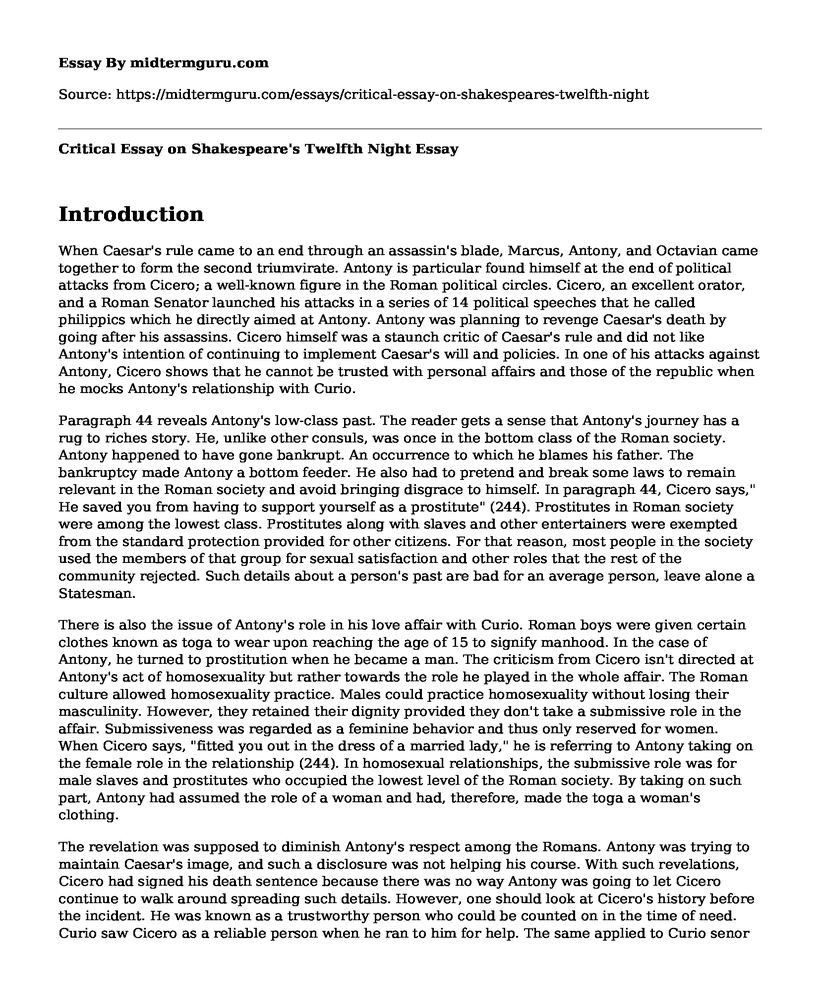Introduction
When Caesar's rule came to an end through an assassin's blade, Marcus, Antony, and Octavian came together to form the second triumvirate. Antony is particular found himself at the end of political attacks from Cicero; a well-known figure in the Roman political circles. Cicero, an excellent orator, and a Roman Senator launched his attacks in a series of 14 political speeches that he called philippics which he directly aimed at Antony. Antony was planning to revenge Caesar's death by going after his assassins. Cicero himself was a staunch critic of Caesar's rule and did not like Antony's intention of continuing to implement Caesar's will and policies. In one of his attacks against Antony, Cicero shows that he cannot be trusted with personal affairs and those of the republic when he mocks Antony's relationship with Curio.
Paragraph 44 reveals Antony's low-class past. The reader gets a sense that Antony's journey has a rug to riches story. He, unlike other consuls, was once in the bottom class of the Roman society. Antony happened to have gone bankrupt. An occurrence to which he blames his father. The bankruptcy made Antony a bottom feeder. He also had to pretend and break some laws to remain relevant in the Roman society and avoid bringing disgrace to himself. In paragraph 44, Cicero says," He saved you from having to support yourself as a prostitute" (244). Prostitutes in Roman society were among the lowest class. Prostitutes along with slaves and other entertainers were exempted from the standard protection provided for other citizens. For that reason, most people in the society used the members of that group for sexual satisfaction and other roles that the rest of the community rejected. Such details about a person's past are bad for an average person, leave alone a Statesman.
There is also the issue of Antony's role in his love affair with Curio. Roman boys were given certain clothes known as toga to wear upon reaching the age of 15 to signify manhood. In the case of Antony, he turned to prostitution when he became a man. The criticism from Cicero isn't directed at Antony's act of homosexuality but rather towards the role he played in the whole affair. The Roman culture allowed homosexuality practice. Males could practice homosexuality without losing their masculinity. However, they retained their dignity provided they don't take a submissive role in the affair. Submissiveness was regarded as a feminine behavior and thus only reserved for women. When Cicero says, "fitted you out in the dress of a married lady," he is referring to Antony taking on the female role in the relationship (244). In homosexual relationships, the submissive role was for male slaves and prostitutes who occupied the lowest level of the Roman society. By taking on such part, Antony had assumed the role of a woman and had, therefore, made the toga a woman's clothing.
The revelation was supposed to diminish Antony's respect among the Romans. Antony was trying to maintain Caesar's image, and such a disclosure was not helping his course. With such revelations, Cicero had signed his death sentence because there was no way Antony was going to let Cicero continue to walk around spreading such details. However, one should look at Cicero's history before the incident. He was known as a trustworthy person who could be counted on in the time of need. Curio saw Cicero as a reliable person when he ran to him for help. The same applied to Curio senor when he chose to trust in Cicero and pay off his son's debt. However, Cicero decision to reveal such details portrays him as untrustworthy. Furthermore, he was a family friend to the Curios, and by dragging their name into his fight with Antony, he had tarnished their family name. When Cicero brags about how he helped the family, he is appearing as an imposing figure who only cares about titles and the praise that people accord to him. He doesn't seem to be much different from Antony or Julius Caesar whom he opposes. There is also the manner in which Cicero describes Antony's role in his affair with Curio. Cicero doesn't hold women in high regard. He talks about womanhood as something to be ashamed of. Something that a man should not want to be part of. As a person who was regarded as a champion of freedom, that speech goes contrary to virtues and policies he was championing.
The second philippic was a political speech. The readers were expecting to read about Cicero's attack on Antony's policies. The address was supposed to show the weaknesses of Antony's politics. However, that part of the speech takes on a personal nature which Cicero is not known for. The issues discussed by Cicero had no way of helping the Roman people, if anything, they portrayed Antony as an ordinary Roman with weaknesses that he kept hidden. The people were trying to abandon the perfect political figure that had been characterized by Caesar, and while Antony was trying to own that image, the people wanted to let go of it. These issues should convince the readers that he was not a good a statesman as they thought.
Cite this page
Critical Essay on Shakespeare's Twelfth Night. (2022, Sep 25). Retrieved from https://midtermguru.com/essays/critical-essay-on-shakespeares-twelfth-night
If you are the original author of this essay and no longer wish to have it published on the midtermguru.com website, please click below to request its removal:
- Essay on An American Tragedy by Theodore Dreiser
- Where Are You Going, Where Have You Been? by Joyce Carol Oates - Essay Sample
- Essay on Hemingways Soldiers Home and Big Two-Heated River
- "Inherit the Wind" Act II and III Essay Example
- Theme of Self-Expression in Gilman's "The Yellow Wallpaper" and Kennedy's "In a Prominent Bar in Secaucus"
- Literary Analysis Essay on Beowulf's Teachings
- Critical Essay on Beowulf: The Medieval Hero







